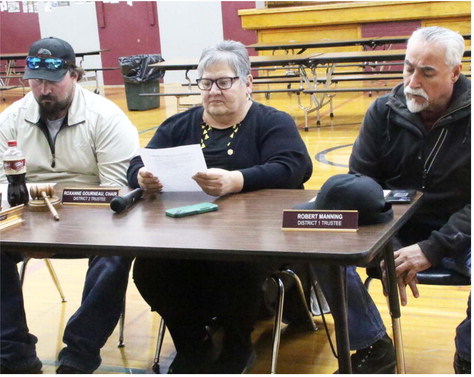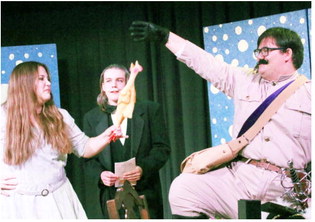Dryland Field Tour In Sidney July 17
Research looking at pulse crop diseases, new durum varieties, native pollinators and new options for wheat stem sawfly and grasshopper management are just a few of the research topics to be presented at the 2024 joint ARS-MSU Dryland Field Day in Sidney, Wednesday morning, July 17, from 9 am to 12:30 pm. The tour is presented by Montana State University’s Eastern Ag Research Center (EARC) and the USDA Agricultural Research Service’s (ARS) Northern Plains Agricultural Research Lab (NPARL) and features speakers from both Sidney research facilities as well as others from the Mandan, N.D. ARS facility and MSU Bozeman.
The combined half-day activities begin at the ARS research farmsite located about 4 miles north of Sidney on the Culbertson highway (Highway 16). Take a left at County Road 129 and a second left on County Road 346 to get to the farmsite.
Registration opens at 8:45 a.m. with coffee and doughnuts followed by the start of the tour at 9 a.m.
The tour will subsequently move to the MSU dryland farm across the highway for additional research talks and conclude with a free lunch at 12:30 pm sponsored by the Richland County Extension Office. Everyone is welcome to participate. Included in the day’s presentations are a unique ARS study using straw bales as a means to move large numbers of wheat stem sawfly biocontrol agents to newly infested regions and one using soil microbes to promote disease resistance in peas. Pulse crop research is also featured in the day’s EARC studies including those looking at pulse crops and protein, along with longterm rotation effects on lentil and pea pathogens. Guest speakers have also been invited to discuss grasshopper management and new durum varieties developed at MSU Bozeman and a new ARS study incorporating solar panels into livestock forage systems at the Mandan, N.D. research facility.
Speakers and topics at the ARS Sidney dryland farmsite include:
•Spring wheat yield, soil nitrate-nitrogen, and nitrous oxide emissions from slow nitrogen release fertilizers Upendra Sainju, Soil Scientist, USDA-ARS, Sidney
•The soil microbiome advantage: How beneficial microbes promote a thriving soil agroecosystem and healthy plants - Rosalie Calderon, Post Doc, USDA-ARS, Sidney
•Establishment of native grasses and forbs for pollinator- friendly CRP fields - Brett Allen, research agronomist, USDA-ARS, Sidney, and John Hendrickson, Research Rangeland Mgt. Specialist, USDA-ARS, Mandan, N.D.
•Bees and insect pollinators of the northern Great Plains - Joshua Campbell, Res. Ecologist – Pollination Specialist, USDA-ARS, Sidney •Special Guest Presentation: o Integrating solar panels with dryland livestock forage systems – John Hendrickson, USDA-ARS, Mandan, ND Talks at the EARC dryland farm site include:
• Pulse crops and protein - William Franck, Res. Scientist, MSU-EARC, Sidney
• Measuring the impact of weather on ascospore release for improved chickpea Ascochyta blight predictions - Alma Chinchilla, Plant Pathology Res. Asst., MSUEARC, Sidney
• The effect of long-term rotations and previous crop on pea, lentil pathogens Frankie Crutcher, Plant Pathologist, MSU-EARC, Sidney • Wheat stem sawfly update: Developing conservation and augmentation approaches to improve biological control of wheat stem sawfly - Tatyana Rand, Research Ecologist, USDA-ARS, Sidney
•Special Guest Presentations: o Grasshoppers: An inconsistent, but challenging insect pest of Montana - Erika Rodbell, Extension Agronomic Entomology Assoc. Spec., MSU-Bozeman o Brief update of durum breeding and new varieties BranDee Johnston, Crop Variety Promotions and Educ. Spec., MSU-Bozeman, MT Field tour participants will qualify for 1 pesticide point in the following categories: 10 – Dealer; 30 - Agricultural Plant Pest Control; 37 - Right of Way Pest Control; 39 Demonstration & Research Pest Control; 55 - Regulatory Weed; 60 - Private Agricultural Pest Control.
This is the first time in the last five years that the joint tour has been held and it’s coming back as an every-other- year event. COVID restrictions and then staff shortages delayed its reintroduction until now, according to field day organizers.
For questions or more information, contact Beth Redlin at 406-433-9427 or email beth.redlin@usda.gov.

